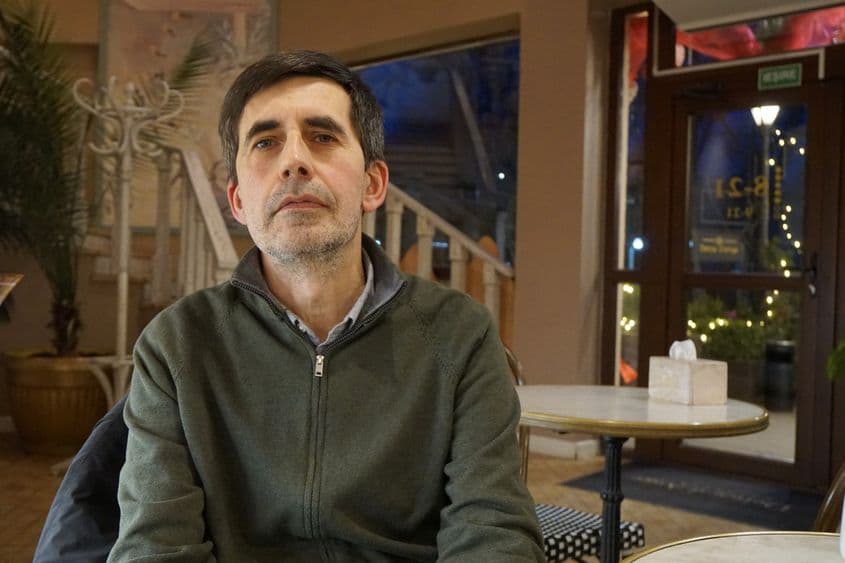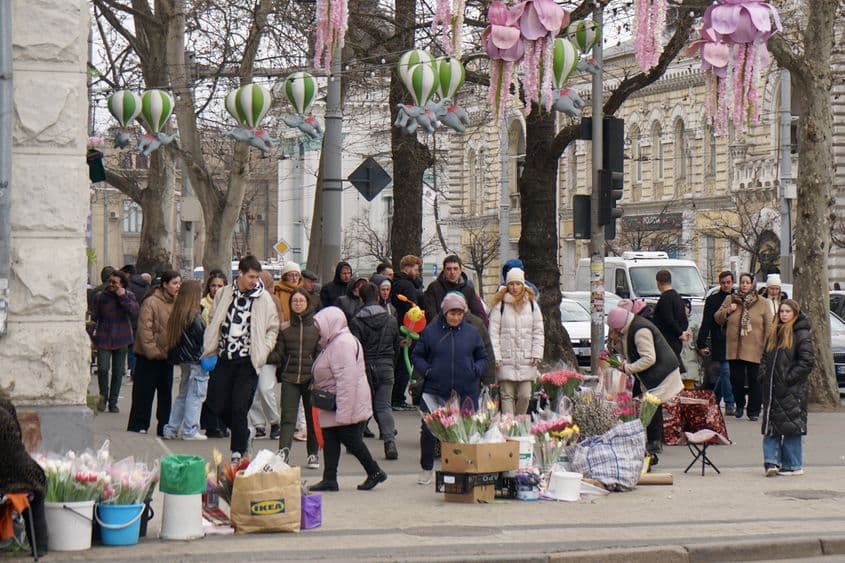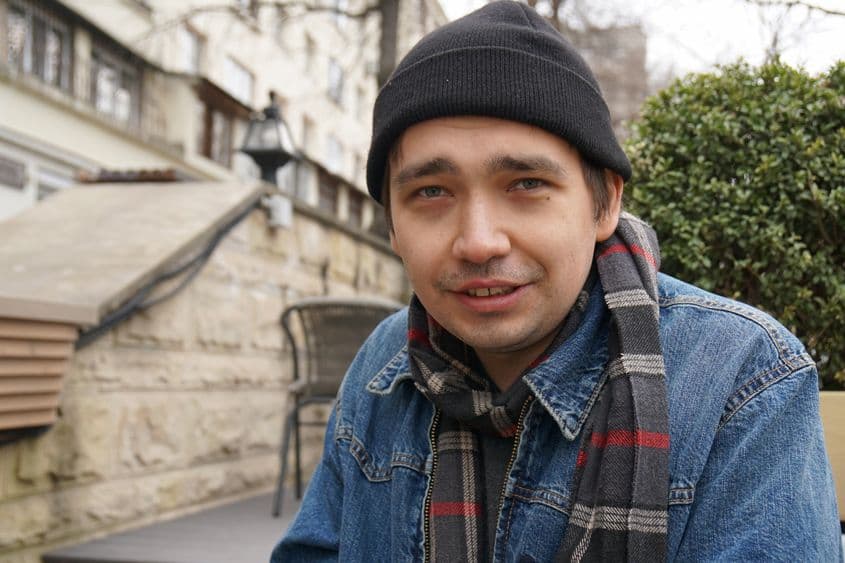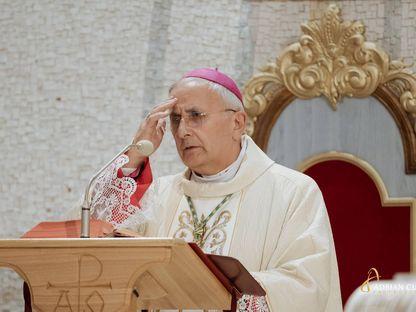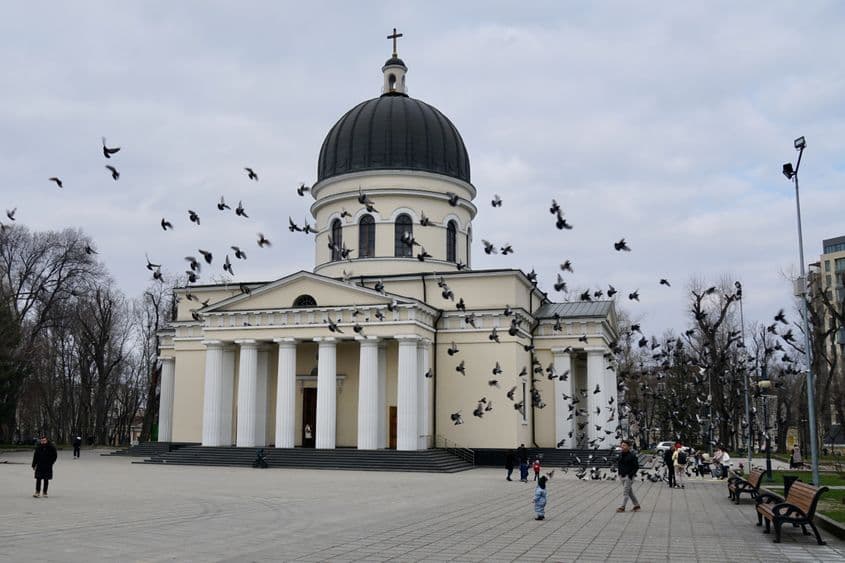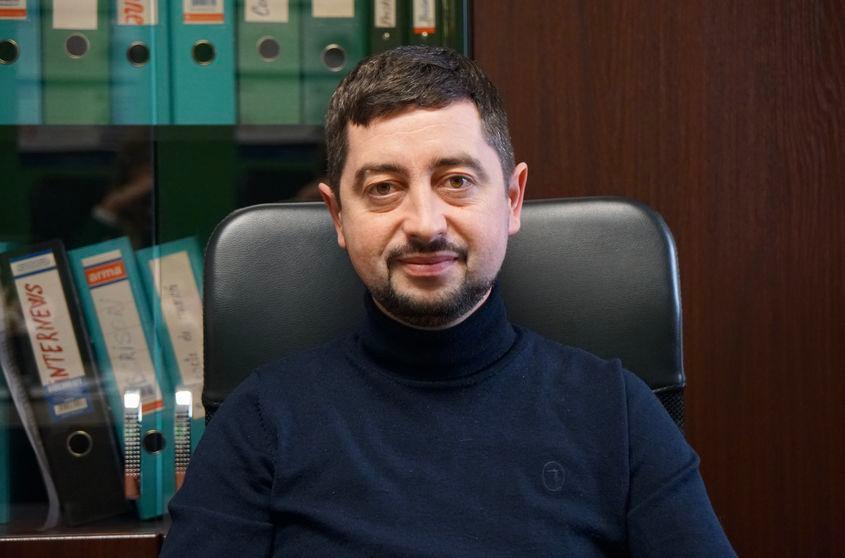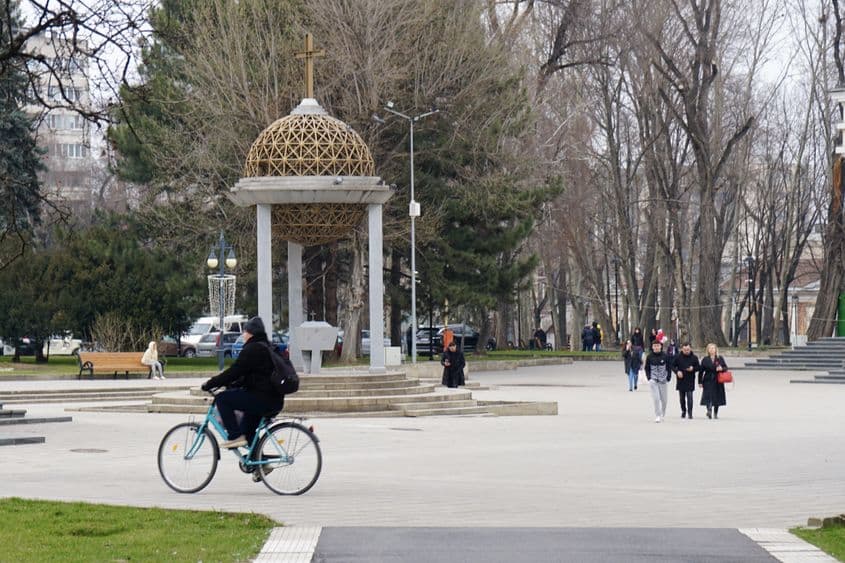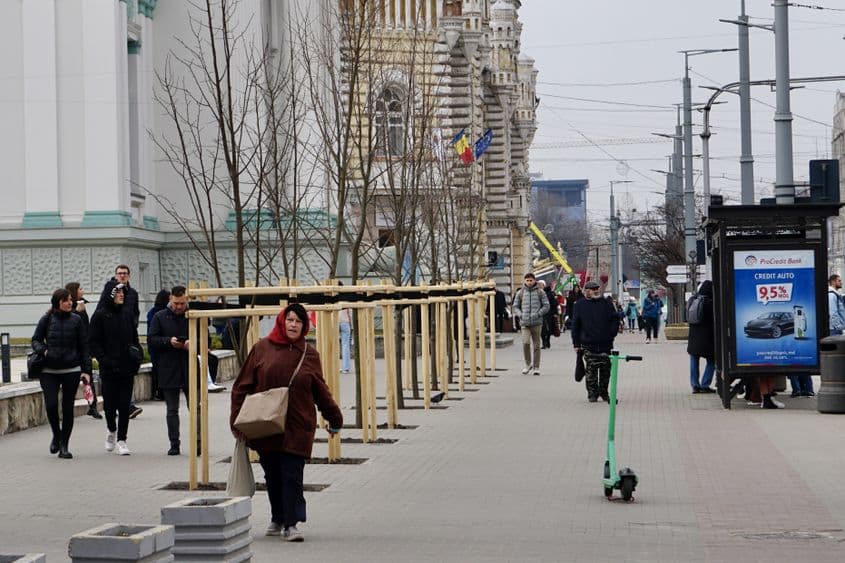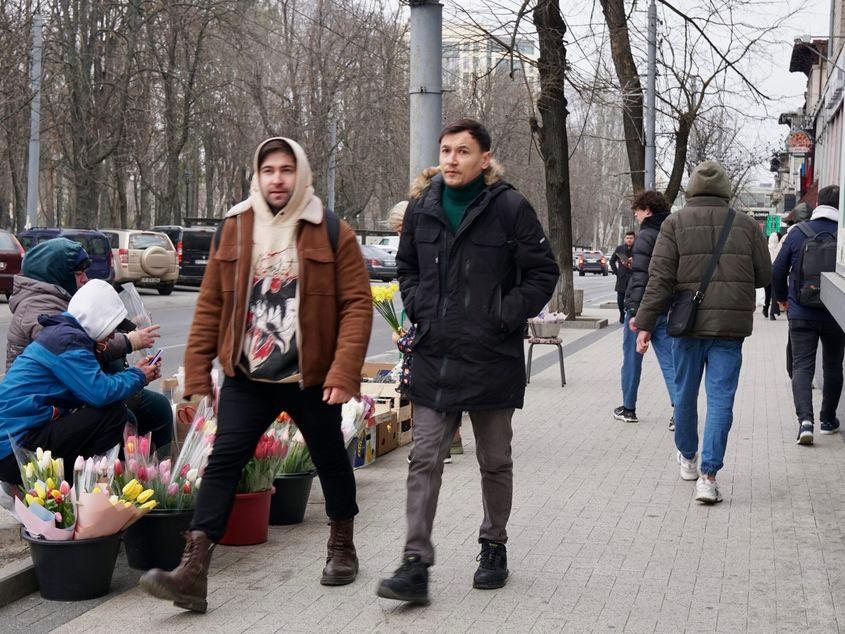
Foto: Carolina Drüten
20/03/2024
Correspondence from Chișinău: “We're in an extremely active phase of a real political war. (…) Putin wants to attack Moldova, be it in two or ten years”
From a military standpoint, the Russians currently cannot attack the Republic of Moldova. However, Putin has a long-term strategy and remains committed to his war objectives. He is already laying the groundwork. A visit to Chișinău reveals how he is getting assistance from within.
Russian tanks are rolling towards the Moldovan capital Chișinău. Masses of people are fleeing to Romania. A plane carrying the Moldovan government is shot down by a MiG fighter jet.
These scenes are from a novel by Moldovan author Iulian Ciocan. It's titled "And in the morning, the Russians will be here" (Iar dimineaţa vor veni ruşii). In early 2022, this seven-year-old work nearly became reality. Had Ukrainians not staunchly defended their country against the Russian onslaught, Kremlin soldiers might have continued marching – straight into the Republic of Moldova.
While not an immediate threat, this danger persists. Currently, Russia lacks the military capability for an offensive in Moldova. Yet, Russian President Vladimir Putin possesses perseverance, signaling his commitment to his war objectives. He's already laying the groundwork through a hybrid operation. And he is getting assistance from within.
Author Ciocan sits in a French-style café in Chișinău, setting his tea cup down. "Russia regards Moldova as its territory," he says. The 55-year-old believes Moscow would seize any opportunity to invade his homeland, citing Russian Foreign Minister Sergei Lavrov's recent assertion that Moldova is following in Ukraine's footsteps.
"Russia considers the Republic of Moldova as its territory", says Iulian Ciocan. Photo: Carolina Drüten
The Ukrainian army, however, has thus far prevented this scenario. As long as the port city of Odessa – barely 60 kilometers from Moldova's border – remains under Kyiv's control, Chișinău doesn't anticipate an invasion. It's a core Moldovan interest for Ukraine to win the war. And for the West to do everything in its power to ensure that outcome.
Recently, France and Moldova signed a defense agreement. Paris wants to prevent the small republic from suffering the same fate as Ukraine, for the Russian government uses similar arguments in both cases. It presents itself as the protector of Russian-speaking people in the post-Soviet space. "I'm not a nationalist; I like the Russian language," says Ciocan. "But I don't want to become part of Putin's Russia."
Mulți ne citesc, puțini ne susțin. Fără ajutorul tău, nu putem continua să scriem astfel de articole. Cu doar 5 euro pe lună ne poți ajuta mai mult decât crezi și poți face diferența chiar acum!
Like Ukraine, Moldova is destabilized by a pro-Russian separatist republic: Transnistria, a strip of land in the east of the country beyond Chișinău's control. Up to 1,500 Russian soldiers are stationed there, alongside 10,000 to 15,000 Moscow-aligned paramilitaries.
Mihail Calarașan grew up in Rybnitsa, a city in northern Transnistria. His mother tongue is Russian. In kindergarten and at school, he remembers learning that Russia was a friend and Moldova was the enemy. "When you live there, you believe this shit," he says, taking a drag from his hand-rolled cigarette. Despite the low temperatures, he wears a denim jacket. "People in Transnistria want to belong to Russia because they're exposed to propaganda."
Calarașan's classmates went to study in Ukraine or Russia. He himself has Moldovan relatives outside Transnistria, leading him to move to Chișinău at 18. At university, he made friends and began to understand how his worldview had been shaped. That was twelve years ago. Today, he works as a documentary photographer.
Predator in Robes: The Diocese of Iași and the Vatican Buried a Sexual Assault Committed by a Catholic Priest Against a Minor in Bacău, Failing to Alert Prosecutors
A Roman Catholic priest abused a 13-year-old girl in the parish where he served in Bacău County: the bishop of Iași knew about it, sent the case to the Vatican, and applied canonical sanctions, but did not notify the authorities, who only intervened later and sentenced him to prison.
His work was recently exhibited in Varnița, a village right on the de facto border with Transnistria, which runs along the Dniester. Calarașan had photographed people on both sides of the river to show that they are like each other, citizens of the same country. The Transnistrian regime considers this to be "extremism", he says. That is why he does not dare to travel to his old home at the moment.
Moldova's heavy industry is located in Transnistria, a legacy of the Soviet era. Since the start of the war, the border with Ukraine has been closed, leaving the only route for goods through the rest of Moldova to Romania and thus the EU. The Moldovan government exploits the newfound dependency of the separatists, implementing tariffs at the beginning of the year. Their aim is to peacefully force the rebellious region back into integration with a policy of maximum pressure.
Un newsletter pentru cititori curioși și inteligenți.
Sunt curios
The Transnistrian regime subsequently sought protection from Russia – a plea for help from a cornered entity. But nothing to worry about too much, from the perspective of the Moldovan government. As the real danger at the moment is looming elsewhere.
A modest office in a Chișinău backyard. It’s a public holiday, but Valeriu Pașa from Watchdog.md is working anyway. His think tank aims to create a favorable environment for Moldovan democracy. However, recent developments worry Pașa. "Putin wants to attack Moldova, be it in two or ten years," he says. "He wants to keep all options open, so that in the hypothetical event of a military success in southern Ukraine, he can also occupy Moldova."
Specifically, this means keeping Moldova out of the EU and NATO, ensuring that the country remains socially and militarily weak, undermining state institutions and strengthening Russia's supporters in Moldova. "For this, Putin needs control over political power," says Pașa, who also advises the Moldovan government. The strategic benchmark will be the upcoming parliamentary elections, expected in July 2025. The balance of power will determine who can favor a pro-European policy – and who can block it.
Russia sponsors political parties, media, influencers on social media, and anonymous Telegram channels in Moldova, according to Pașa. He cites the example of pro-Russian oligarch Ilan Șor, who has faced sanctions from the EU and the USA. "We estimate that he spent around €300,000 on Facebook advertising alone in the last four months of 2023," says the expert. And this is just a fraction of the hybrid operation.
Despite warnings from Chișinău, Meta, the parent company of Facebook, continues to accept these funds. Paid protests, voter bribery, and corruption, especially in the judiciary, further exacerbate the situation. Recently, the governor of Gagauzia, an autonomous region in Moldova, visited Sochi and met with Putin. "We're in an extremely active phase of a real political war," says Pașa.
President Maia Sandu and her government are aware of the problem. They aim to enshrine the desired EU accession in the constitution – in case the balance of power shifts – and are planning a referendum in the fall. A survey conducted last July by the American International Republican Institute found that 63% of respondents supported EU membership. However, a portion of the population remains firmly pro-Russian. Putin will seek to prevent a positive outcome as much as he will Sandu's re-election, which is up later this year as well – possibly on the same day as the referendum. Critics are saying that this poses a potential advantage for the incumbent.
Two years after the Russian attack on the entire Ukraine, book author Ciocan hopes his novel remains dystopian. "When I think of the Ukrainians, we Moldovans were lucky," he says. But it's too early to breathe a sigh of relief.
This text is part of a series of articles proposed by TEFI, a cross-border editorial project developed by some of the most powerful newsrooms in Central and Eastern Europe: Gazeta Wyborcza (Poland), Magyar Jeti / 444 (Hungary), SME (Slovakia), Bellingcat (Netherlands), PressOne (Romania), united in a European-funded consortium to promote national and regional security issues.
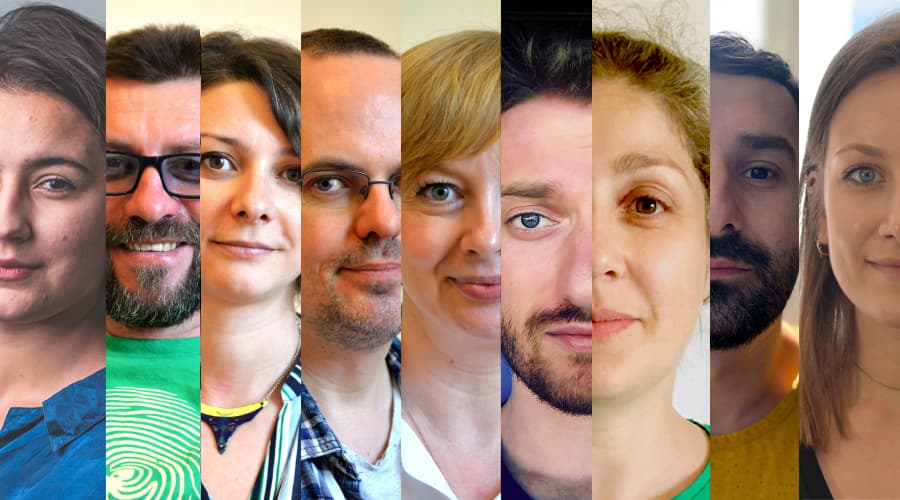
Avem nevoie de ajutorul tău!
Mulți ne citesc, puțini ne susțin. Asta e realitatea. Dar jurnalismul independent și de serviciu public nu se face cu aer, nici cu încurajări, și mai ales nici cu bani de la partide, politicieni sau industriile care creează dependență. Se face, în primul rând, cu bani de la cititori, adică de cei care sunt informați corect, cu mari eforturi, de puținii jurnaliști corecți care au mai rămas în România.
De aceea, este vital pentru noi să fim susținuți de cititorii noștri.
Dacă ne susții cu o sumă mică pe lună sau prin redirecționarea a 3.5% din impozitul tău pe venit, noi vom putea să-ți oferim în continuare jurnalism independent, onest, care merge în profunzime, să ne continuăm lupta contra corupției, plagiatelor, dezinformării, poluării, să facem reportaje imersive despre România reală și să scriem despre oamenii care o transformă în bine. Să dăm zgomotul la o parte și să-ți arătăm ce merită cu adevărat știut din ce se întâmplă în jur.
Ne poți ajuta chiar acum. Orice sumă contează, dar faptul că devii și rămâi abonat PressOne face toată diferența. Poți folosi direct caseta de mai jos sau accesa pagina Susține pentru alte modalități în care ne poți sprijini.
Vrei să ne ajuți? Orice sumă contează.
Share this


